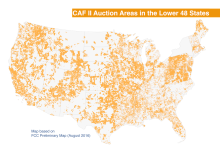Shape the Rules for Rural Broadband Subsidies Fact Sheet - Reply Comments: October 18th, 2017
Another addition to our Community Networks Initiative resources! This fact sheet details the most important aspects of the Connect America Fund (CAF) Auction. What is it? What should it do? Who does it affect? And how can you make a difference?
The Federal Communications Commission (FCC) manages the CAF program, which provides billions of dollars in subsidies to Internet service providers for areas where the cost of building networks is prohibitive. Some large providers decided not to accept some of the subsidies during Phase I - about $198 million annually for 10 years. Now, the FCC plans to host an auction so that providers can submit competing proposals on how best to serve these often rural, high-cost areas. (Check out the map of preliminary areas on the FCC website.)
Before the FCC can hold an auction though, the commission needs advice on how best to conduct it and what criteria they should consider. Jon Chambers, former head of the FCC's Office of Strategic Planning and Policy Analysis, outlined his concerns about the current proposed rules in his article, The Risk of Fraudulent Bidding in the FCC Connect America Fund Auction. Listen to his analysis on Episode 268 of the Community Broadband Bits Podcast.
The first round of public comments has passed, but reply comments are due October 18th, 2017. Read the fact sheet and then submit your own comments at FCC.Gov/ecfs/filings for "Proceedings" Docket 17-182 and Docket 10-90.




